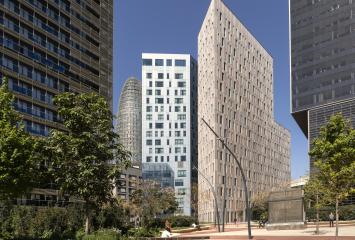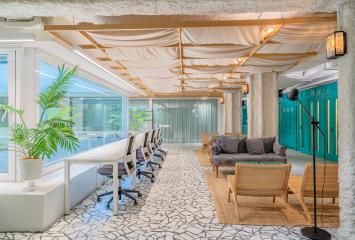The transcendental role of offices in business culture
No one can let go of their identity. Their beliefs, their norms, their attitudes, their principles and their expectations are always there. Regardless of whether they have been amassed consciously or unconsciously, they are unavoidable and an innate condition of being alive. And exactly the same thing occurs with businesses. Far from being lifeless, mechanical, empty organizations, they are entities endowed with a code of ethics. Ethics which are assimilated by everyone, from the director of the company to the trainee just starting out in the business. There are no exceptions. This is what is known as business culture.
The importance of business culture
Companies that do not actively construct their own business culture, but allow it to form in an uncontrolled manner, run the risk of creating much less competitive environments as well as projecting an unfavorable image to the world. In this regard, premeditated consensus on business culture is key to the success of a company. Among other things, it provides cohesion and a sense of identity for employees, makes your business stand out from the competition and is a motivating force, since we are social creatures who enjoy the feeling of being part of a collective. The culture of this collective, however, must not be stagnant but constantly changing.
The evolution of business culture
In the past, companies usually had a hybrid business culture somewhere between an authoritarian culture, a bureaucratic culture and a goal-driven culture, in varying proportions depending on the company. Prevailing values had a lot to do with hierarchy, the concentration of decision-making, procedural rigidity, control and pressure. These features, however, began to decline as agents of change entered the scene, such as digital transformation, environmental awareness and placing employee satisfaction at the heart of a company’s objectives. The pandemic has reinforced these three trends
to such an extent that good companies these days are not cold machines that prioritize their needs at all costs but rather friendly environments that understand the needs of their workers. As the talent expert Bill Schaninger explains in an interview for the McKinsey blog, “individual purpose is something that we are seeing come to the fore”. Not as a force that competes with the purpose of the company but as a complementary force that drives that purpose. We are witnessing the birth and strengthening of a hybrid business culture in which human development is as much of a priority as sales volume. And this does not just apply to the metaphysical aspects of values but also, and especially, to the physical aspects. The office plays an important role.
The office that 21st-century business culture requires
Offices cannot continue to be mere sterile settings. By contrast, and as Schaninger himself notes, “companies have to give meaning to the presence of workers in the office, so that they know that being there is important”, because their presence helps build the company culture and in turn the company culture nourishes employees and promotes personal growth. This is especially the case when it comes to the search for purpose, something the psychiatrist Viktor Frankl, author of the famous essay Man’s Search for Meaning, considered essential for human beings to achieve well-being. And how does one achieve this? To a certain extent by creating offices that fit in with prevailing social values.
In other words, business culture should not only be imprinted in the behavior of people, in internal guidelines or in bonding activities, but also in the environment, in the furniture, in the installation of heating, in digital technologies, which unlock the limitations of human creativity, in the roofs or in efficient lighting, which relentlessly pursues sustainability, something that will reassure any employee. Offices should be pleasant, open, morally-responsible and versatile spaces. Such versatility is the essence of the 21st-century worker, whose purpose and needs gradually change as time goes by.
In this sense, the modular spaces that we offer at Colonial allow companies to demonstrate their resilience and adapt to the new needs of employees as well as social realities. How, you ask? It’s simple. The company rents the office and is then free to move the walls and adapt the rooms to create the exact type of office they require at any given time. Nowadays, for example, the need for increasingly differentiated meeting areas, enhanced by the interactivity to which we became accustomed during the pandemic, leads many of our clients to configure the walls however they like. And this flexibility is also a symptom of a healthy business culture.

